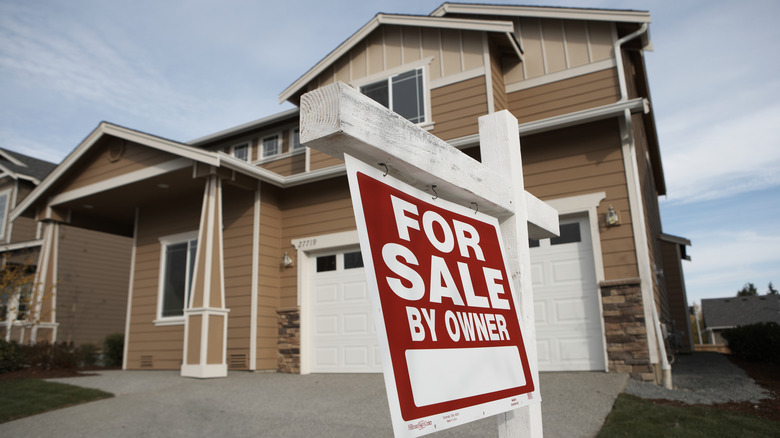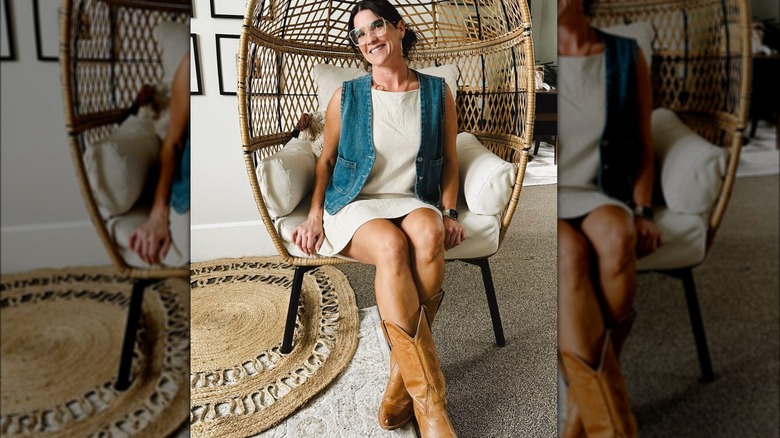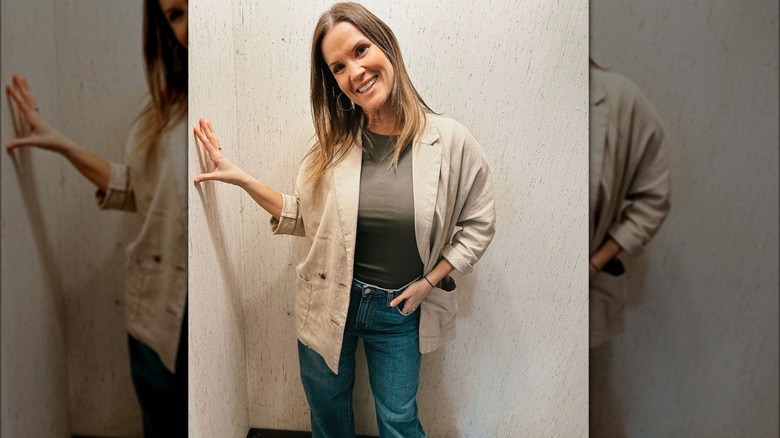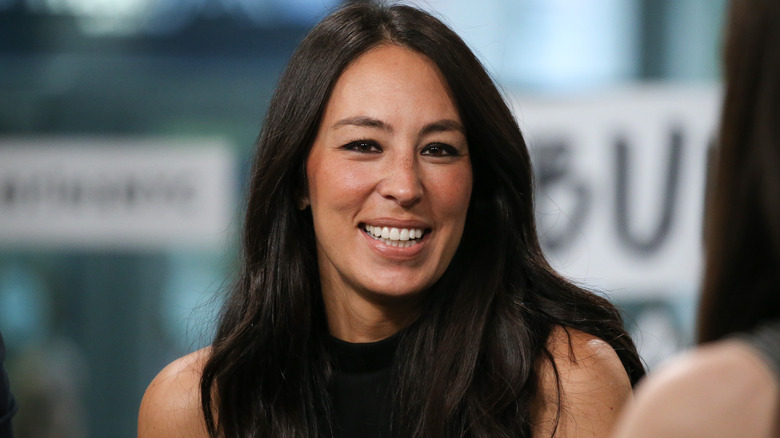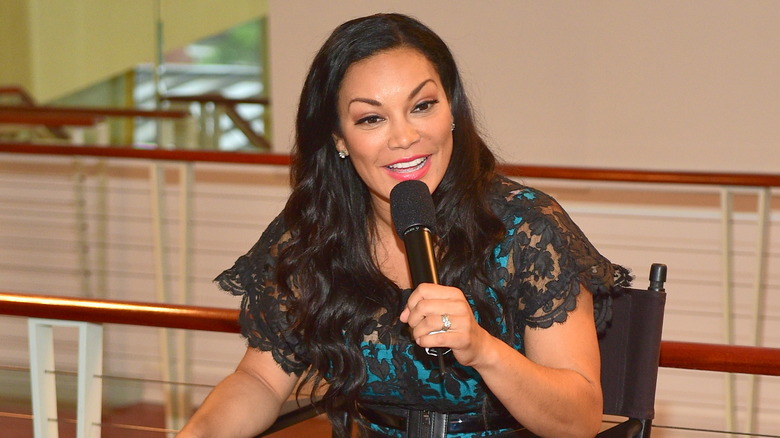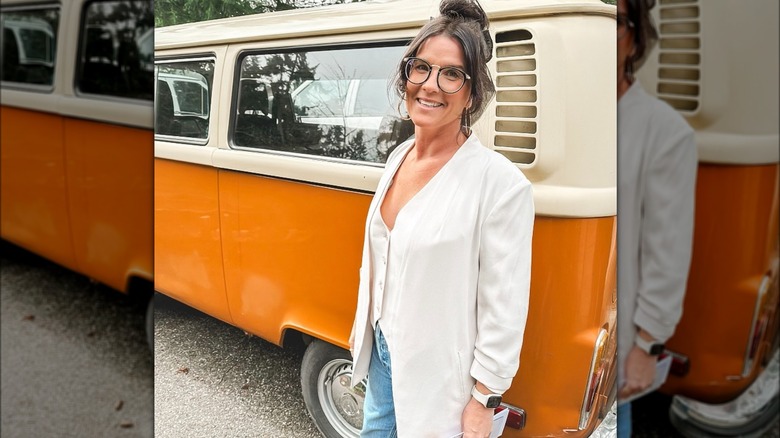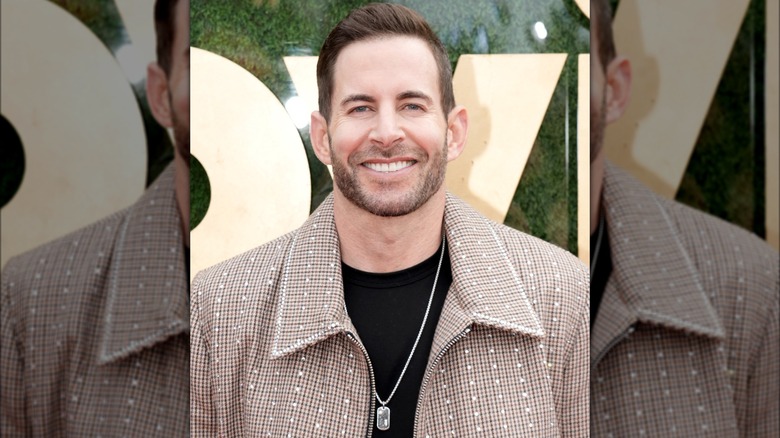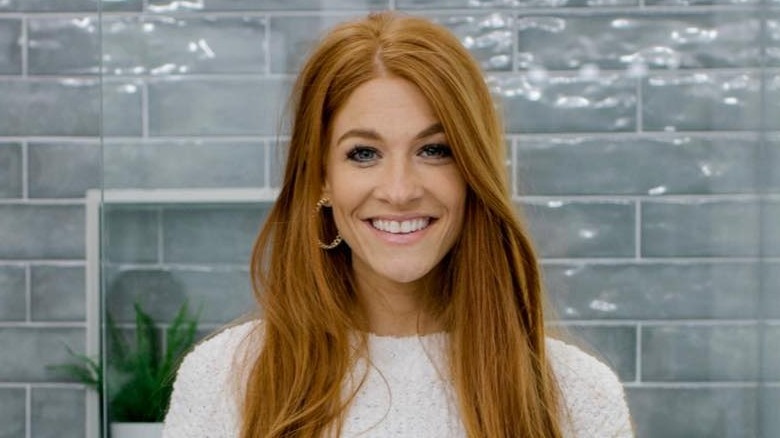Valuable Real Estate Tips And Tricks HGTV Stars Swear By
There is a lot of noise out there when you want to enter the housing market, no matter which side you are on. You'll hear a lot of "do this, actually no, do that instead." It can be overwhelming to know what advice you should listen to and what chatter you should set to the side. If you're feeling a bit overwhelmed, there is no better place to start than at the source — we're talking about HGTV stars who are experts in buying and selling property.
Your favorite HGTV names, like Joanna Gaines, Drew and Jonathan Scott, and even Tarek El Moussa and Egypt Sherrod have been in the game for years. They know what it takes to entice buyers, get the best price, and even secure the home of your dreams without all the drama. Whether you are looking to buy or sell — or just want to be informed and ready for when do you — these are the most valuable real estate tips and tricks these HGTV stars swear by.
Tour multiple properties before putting in an offer
Before you start seeing houses in person, it's likely you've spent hours searching online for the perfect property. Yet, the experts recommend getting out there and seeing a few homes in person, even if they aren't perfect, just so you don't get as caught up in the emotions of the process once it's really time. "I always recommend touring at least 10 houses before you put an offer in on one. The first few houses may seduce you aesthetically, but may not really have what you need," Property Brother Drew Scott told HGTV.
It's easy to get really excited while viewing houses you love in person. You might also get tired from seeing so many, especially when the market is hot and you have to make multiple offers. To avoid this happening to you, Scott recommends coming prepared. "When you walk through a home, have a checklist in hand; write down the pros, write down the cons and rate that house from 1 to 10," he advised. "At the end of a long house hunting day, all the houses are going to blend together, and it's that checklist that's going to be the saving grace and will get you your dream home." By doing things this way, you'll be able to make multiple competitive offers on homes that suit your lifestyle and budget, giving you more chances at a happy outcome.
Consider adding bedrooms to boost value
If your house just won't move on the market, it's time to take a step back and really think about how you can add value to it. What is it missing to buyers that you just can't see? According to Lyndsay Lamb of "Unsellable Houses," the key is in the number of bedrooms. "Most buyers know that you don't need three bedrooms today," she told the audience in Season 2 Episode 2, "Two-Bedroom Dilemma," per YouTube. "Down the road, either they're going to want that third bedroom, or it's smart to have that three-bedroom for resale." In the end, Lamb and her sister Leslie Davis add a third bedroom to the property. The increase in square footage is arguably what pushes the eventual sale over the finish line.
In the episode, the pair changed an office space into a bedroom, so don't think you have to add an extension to your home to have success. The good news is that no matter which path you choose, new construction or conversion, each bedroom can add roughly $30,000 to $50,000 to your home's value (via New Silver). It's truly a worthwhile investment.
Keep an open mind about what you want
We all have a list of things we want in a dream home, but experts warn that we can't always get everything we want. "Flexibility in all categories of home buying is kind of necessary when you're going in, because we can only get what's out there and available at the moment," longtime channel host Genevieve Gorder told HGTV. So, while you might be interested in a condo in a specific building, a home with a detached garage in a certain school district, or a townhouse without a high HOA fee — what you actually end up buying will be heavily influenced by the stock that's available at the exact moment you are willing to buy.
Yet, don't be discouraged, as there is always a light at the end of the tunnel. "Be careful and don't say 'no!' Don't talk yourself out of something before you actually see it for yourself," Egypt Sherrod, host of "Property Virgins" chimed in. "What you often say you want, you wind up with something completely different. But how much easier would it be if you stayed open from the beginning." Though you should definitely have a list of what you want, always keep an open mind. Don't count out a property until you've seen it in person!
The online listing is just as important as the in-person staging
When selling a house, you have to think like a buyer. Are you willing to risk going to an in-person viewing if the home's online presence is bad? Without following the advice you've learned in this article, probably not. Most buyers in your area are likely the same way. "Lyndsay and I are very much about not rushing the process. You get one opportunity to make a first impression," Leslie Davis told Realtor.com. "It's like online dating: You need to make sure that that first picture you have online [is] showcasing your property and the best angles, the best lighting, the best features, so that that buyer, with the two seconds that they're going to take of swiping through that website, they're going to stop on yours and want to look further in."
If people like what they see online, then they are more likely to come and see the house in person. So, even if you spend hundreds of dollars making sure your staged home shines, it won't matter if no one is coming to look at it because all the listing photos are blurry or too zoomed in. If you don't want to splurge on a professional photographer, at least be sure to put real time and effort (and good lighting!) in the photos you take with your cell phone.
Be careful of what you say at home showings
If you walk into a home showing and think "Oh my gosh, I am going to raise my family here," you might think common sense is to tell the listing agent immediately. After all, you love it, right? Isn't it a good idea to let the person selling it know you'll take good care of their home and that you really, really want to live there? Unfortunately, this isn't usually the case. "If you truly love a home? Watch out: If you're at an open house and gush over how perfect the place seems, the listing agent is probably listening in — and will likely advise the seller not to budge on their asking price," Tarek El Moussa from "Flip or Flop" told Realtor.com. "Real estate agents are amazingly good at reading emotions and using every bit of that knowledge to negotiate to the last penny."
Instead, to avoid being taken advantage of, play your cards a bit closer to your chest. It's important to be pleasant and polite at home showings. However, you don't want to give the sellers any reason to play on your hopes during a bidding war. Buying a house can be an extremely emotional choice at home (after all, you are choosing your nest!), yet El Moussa argues that not letting those in charge of the contracts know how you're feeling can sometimes save you plenty of hassle and grief.
Be wary of being a home's very first owner
You might think that purchasing a brand new home means you've hit the jackpot. Everything from the appliances to the finishes should be top of the line and in perfect working order, right? Well, sometimes this is wrong. "In order to pump these homes out as fast as the builders want to, some of them cut corners like not waiting long enough for concrete to cure properly or hiring untrained labor forces," Property Brother Jonathan Scott told HGTV. "I'm not saying new construction is bad; you just want to find a builder who has a quality product — it's going to last a lot longer."
Scott isn't the only HGTV star with this warning. "One time, I put an offer on a new house ... Since it was new construction, the buyers didn't think that an inspection was necessary. I told them it was worth the few hundred dollars, and insisted," Tarek El Moussa told Realtor.com. "We ended up finding that the builder had faulty plumbing ... which was found to be the case for the entire newly built neighborhood!" To keep yourself safe from this situation, both men recommend never skimping on the full home inspection process. You might be tempted to skip it when purchasing a new build, but experts advise that this is when you might need the second pair of eyes the most.
Check the foundation when buying a fixer upper
Whether you are purchasing a home that needs a little TLC because you plan on living in it or want to flip it for profit, Joanna Gaines cannot be more clear: Check out that house's foundation before you sign anything! "One thing I want to stress is that every home has potential. But ultimately the potential has to meet the total renovation budget realistically," Gaines told Architectural Digest "Always get an inspection to make sure the home is structurally sound; we've seen foundation issues that will cost up to $20,000. If the cost of the structural issues is cutting too much into the total renovation budget, we know it's not 'the one' and encourage our clients to keep looking."
While checking the foundation is a part of the routine home inspection process, it is a nonnegotiable when buying a fixer upper. As the purchaser, you might be able to clock wood with dry rot or an ugly countertop from a mile away. These are typically more or less cosmetic issues that are an expected part of the process. Structural issues, like foundation cracks or leaning, are a whole other story. If you do find them and still want to proceed, you should be able to negotiate a steep discount. As once discovered, the lister cannot legally sell the home without disclosing the problem to each potential buyer.
If you have a favorite property, check out the neighbors, too
There is nothing worse than going through all the trouble to buy your dream home and then finding out it's in an awful location. You can picture it now: Nonstop construction, noisy neighbors, or poorly rated schools. To avoid being stuck with a bad surprise, you should investigate these things before buying. "Nothing compares to actually walking the neighborhood prior to buying in the community. Pounding the pavement will give you a clear image as to how noisy it is, the density of traffic and what your neighbors are like," Drew Scott told HGTV. "Getting to know the locals will give you that insider scoop as to whether or not this is the kind of neighborhood you want to raise your family in."
While you might not feel comfortable knocking on doors, in most neighborhoods it's normal enough to have a quick chat with others in public spaces, like the park. If online research is more your vibe, consider joining groups near your potential new home, like on Nextdoor or Facebook, to see what the concerns and triumphs of the community are. This way, you can get ahead of any issues and see if it's the kind of place you might really see yourself living.
A good agent can make or break your experience
There is nothing like a good real estate agent, whether you are buying or selling property. You need someone on your team who is going to get you the best price on either side of the deal. "Your real estate agent is the quarterback of your real estate dream team. That's important," Egypt Sherrod told HGTV. "That means they're throwing the ball and they're calling the shots. And they're going to get you to where? .... That's right, a touchdown."
Yet, finding this perfect agent is easier said than done. The signs of a bad real estate agent are many, including a bad attitude, poor communication, and even in some extreme cases, a lack of licensing. So, how are you supposed to find a good one? "There are three great ways that you can find a qualified Realtor," Sherrod continued. The first is to look at the website of local realtor associations. The National Association of Realtors is a great place to start. You can also chat to your friends or family who have recently bought a house and see if they would recommend their agent. Finally, "Pick up the phone and call the brokerage," said Sherrod. "Ask for the broker of record. They're the boss! They know their agents like no one else."
Always prep your house before you sell it
If you know a move is on the horizon, you might think the only thing you need to do to prepare is to list your property once you're ready to go. Yet, there is so much work that happens ahead of time behind the scenes. "A common mistake is just believing that all they need to do is list it and it'll sell — not taking the time to prepare their home to get the most out of it," Lyndsay Lamb told Realtor.com. "We're not just getting top dollar because your house is beautiful. You have to do something special and different and present it in a great way for a buyer to come along and make that offer."
This can sometimes be minor things, like edging the lawn and adding fresh mulch to the flowerbeds. It can be a little bigger, like removing your personal artifacts from the home and deep cleaning the carpets. Sometimes, the pre-sale house prep can be massive, like what Lamb tends to do on "Unsellable Houses." You might repaint the home's entire exterior, so it doesn't look so tired, or even install new countertops in the kitchen, because the current ones are warped and scratched beyond belief. Selling a home for the best price takes patience and effort — lots of effort. Go the extra mile with staging and repairs, Lamb thinks, and you'll see the best results.
Get approved for a mortgage before touring houses
Not many people have the cash reserves sitting around to purchase a home outright, which is why we take out mortgages. The maximum number the bank allows you to borrow is based on a lot of different things, including your income, your debt, and your current savings. Because these things vary so much, two people in the same job might have vastly different borrowing capacities. It's not a good idea to just assume the bank will lend you a certain amount.
Before you start touring homes and possibly finding one to fall in love with, you need to talk to the bank, or other mortgage lender. "If you are serious about buying, be serious about the financing, and get pre-approved for your loan," Tarek El Moussa told Realtor.com. "Having a pre-qualification letter does not carry as much weight. There's a big difference between what banks say they are willing to lend you and what they actually end up lending." There is nothing more frustrating than losing out on a house you love because you are waiting for financial paperwork to clear. There is also nothing more embarrassing than being told you actually don't qualify for as much as you thought because of your debt-to-income ratio. El Moussa's advice here is golden — know your true borrowing power before you even start looking.
Renovate the kitchen and bathroom for the best resale value
If your home is a bit outdated, there are two main areas that need the most TLC before you sell. "You put your money in the main money makers for homes: main bathrooms and kitchens. Because that's, for whatever reason, what we as a society are really, really impressed by," Jenn Todryk of "No Demo Reno" told The Dallas Morning News. "And they want natural lighting." This is common advice, because it's true. When potential buyers walk into a bedroom or living room that is outdated or not to their taste, they aren't seeing dollar signs. At most, these spaces require a fresh can of paint and the occasional flooring redesign. Yet "wet spaces" like the kitchen and bathroom, where renovations require rerouting plumbing and electricity, are a different story.
"We want a big luxurious bathroom, which is understandable; you start and end your day in it, right?," Todryk continued. While you don't have to turn your practical bathroom into a luxurious one, even the smallest of updates can make a big difference. In fact, the national return on investment for bathroom remodels is up to 70%, meaning they are worth it more often than not (via Remodeling by JLC).
